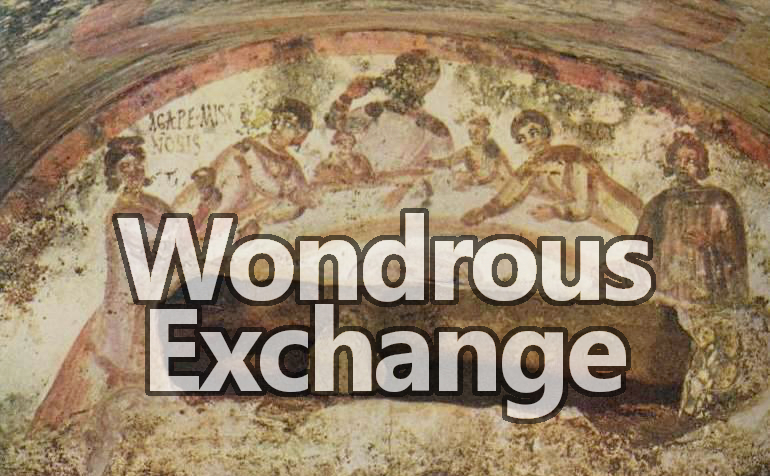 "The Wondrous Exchange" is John Calvin's version of Martin Luther's "The Great Exchange". I mentioned the Wondrous Exchange (or Wonderful Exchange) in my previous post on Martin Luther's The Great Exchange. Calvin's Wondrous Exchange surprisingly does not appear in a loci on atonement in The Institutes of the Christian Religion but is found near the fountain head of Calvin's Doctrine of the Lord's Supper! The event and act of atonement occurs in the real participation of the body and blood of Christ in the bread and wine of the Lord's Supper: "For he in some measure renews, or rather continues, the covenant which he once and for all ratified with his blood (as far as it pertains to the strengthening of our faith) whenever he proffers that sacred blood for us to taste." Martin Luther discovered The Great Exchange but John Calvin has found the location of this Wondrous Exchange!
"The Wondrous Exchange" is John Calvin's version of Martin Luther's "The Great Exchange". I mentioned the Wondrous Exchange (or Wonderful Exchange) in my previous post on Martin Luther's The Great Exchange. Calvin's Wondrous Exchange surprisingly does not appear in a loci on atonement in The Institutes of the Christian Religion but is found near the fountain head of Calvin's Doctrine of the Lord's Supper! The event and act of atonement occurs in the real participation of the body and blood of Christ in the bread and wine of the Lord's Supper: "For he in some measure renews, or rather continues, the covenant which he once and for all ratified with his blood (as far as it pertains to the strengthening of our faith) whenever he proffers that sacred blood for us to taste." Martin Luther discovered The Great Exchange but John Calvin has found the location of this Wondrous Exchange!
The following quotation containing Calvin's Wondrous Exchange, forms point number two in Calvin's famous chapter on the Eucharist (Institutes, IV.xvii.2), and sets Calvin's concept of atonement in the cornerstone of his Doctrine of the Eucharist. Immediately preceding section 2 is a discussion on how we are nourished bodily by The Lord's Supper by the "taste of this sacred food" that "we receive from the flesh and blood of Christ" (Institutes, IV.xvii.1). In the following section, Calvin says, "as bread nourishes, sustains, and keeps the life of our body, so Christ's body is the only food to invigorate and enliven our soul." (Institutes, IV.xvii.3)
"Godly souls can gather great assurance and delight from this Sacrament; in it they have a witness of our growth into one body with Christ such that whatever is his may be called ours. As a consequence, we may dare assure ourselves that eternal life, of which he is the heir, is ours; and that the Kingdom of Heaven, into which he has already entered, can no more be cut off from us than from him; again, that we cannot be condemned for our sins, from whose guilt he has absolved us, since he willed to take them upon himself as if they were his own. This is the wonderful exchange (mirifica commutati) which, out of his measureless benevolence, he has made with us; that, becoming Son of man with us, he has made us sons of God with him; that, by his descent to earth, he has prepared an ascent to heaven for us; that, by taking on our mortality, he has conferred his immortality upon us; that, accepting our weakness, he has strengthened us by his power; that, receiving our poverty unto himself, he has transferred his wealth to us; that, taking the weight of our iniquity upon himself (which oppressed us), he has clothed us with his righteousness." (Institutes of the Christian Religion, IV.xvii.2)
Calvin, John. Institutes of the Christian Religion. Ed. John T. McNeill. Trans. Ford Lewis. Battles. Philadelphia, PA: Westminster, 1960. 1360-3. Print.
(Header Image Source: Wikipedia)



Leave a comment